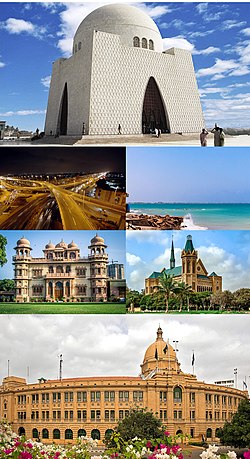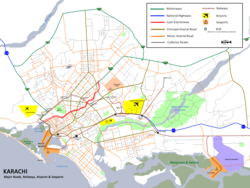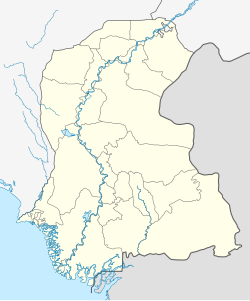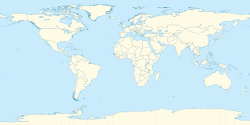
Back Karatsji Afrikaans Karatschi ALS ከራቺ Amharic Karachi AN कराची ANP كراتشي Arabic كاراتشى ARZ কৰাচী Assamese Karachi AST कराची AWA
Karachi
| |
|---|---|
 Clockwise from top: Mazar-e-Quaid; Hawke's Bay Beach; Frere Hall; Karachi Port Trust Building; Mohatta Palace; and Port of Karachi | |
| Nickname(s): | |
| Coordinates: 24°51′36″N 67°0′36″E / 24.86000°N 67.01000°E | |
| Country | |
| Province | |
| Division | Karachi Division |
| Settled | 1729 |
| Metropolitan council | 1880 |
| City council | City Complex, Gulshan-e-Iqbal Town |
| Districts[6] | |
| Government | |
| • Type | Metropolitan Corporation |
| • Body | Government of Karachi |
| • Mayor | Murtaza Wahab[7] (PPP) |
| • Deputy mayor | Salman Murad[7] (PPP) |
| • Commissioner | Salim Rajput[8] |
| Area | |
| • Metro | 3,527 km2 (1,362 sq mi) |
| • Rank | 1st |
| Elevation | 10 m (30 ft) |
| Population | |
| • Megacity | 20,382,881 |
| • Rank | 1st (Pakistan) 12th (world) |
| • Metro density | 5,779/km2 (14,970/sq mi) |
| Demonym | Karachiite[13] |
| Time zone | UTC+05:00 (PKT) |
| Postal codes | 74XXX – 75XXX[14] |
| Dialling code | 021[15] |
| GDP/PPP | $200 billion (2021)[16][17] |
| International airport | Jinnah International (KHI) |
| Rapid transit system | Karachi Breeze |
| Largest district by area | Malir (2,160 km2) |
| Largest district by population (2023 census) | Karachi East (3,950,031) |
| Densest district by population (2023 census) | Karachi Central (55,396/km2) |
| Largest area by GDP (2020) | Saddar Town ($40 billion) |
| Website | www |
Karachi (/kəˈrɑːtʃi/; Urdu: کراچی; Sindhi: ڪراچي; IPA: [kəˈraːtʃi] ⓘ) is the capital city of the Pakistani province of Sindh. It is the largest city in Pakistan and the 12th largest in the world, with a population of over 20 million.[12][18] It is situated at the southern tip of the country along the Arabian Sea coast and formerly served as the capital of Pakistan. Ranked as a beta-global city,[19][20] it is Pakistan's premier industrial and financial centre,[21] with an estimated GDP of over $200 billion (PPP) as of 2021[update].[16][17] Karachi is a metropolitan city and is considered Pakistan's most cosmopolitan city, and among the country's most linguistically, ethnically-, and religiously-diverse regions,[22] as well as one of the country's most progressive and socially liberal cities.[23][24][25]
The region has been inhabited for millennia,[26] but the city was formally founded as the fortified village of Kolachi as recently as 1729.[27][28] The settlement greatly increased in importance with the arrival of the East India Company in the mid-19th century. British administrators embarked on substantial projects to transform the city into a major seaport, and connect it with the extensive railway network of the Indian subcontinent.[28] At the time of Pakistan's independence in 1947, the city was the largest in Sindh with an estimated population of 400,000 people.[22] Afterwards, the city experienced a dramatic shift in population and demography with the arrival of hundreds of thousands of Muslim immigrants (Muhajirs) from India,[29] coupled with a substantial exodus of its Hindu residents.[30] The city experienced rapid economic growth following Pakistan's independence, attracting migrants from throughout the country and other regions in South Asia.[31] According to the 2023 Census of Pakistan, Karachi's total population was 20.3 million.[32] Karachi is one of the world's fastest-growing cities,[33] and has significant communities representing almost every ethnic group in Pakistan. Karachi holds more than two million Bengali immigrants, a million Afghan refugees, and up to 400,000 Rohingyas from Myanmar.[34][35][36]
Karachi is now Pakistan's premier industrial and financial centre. The city has a formal economy estimated to be worth $190 billion as of 2021[update], which is the largest in the country.[37][38] Karachi collects 35% of Pakistan's tax revenue,[39] and generates approximately 25% of Pakistan's entire GDP.[40][41] Approximately 30% of Pakistani industrial output is from Karachi,[42] while Karachi's ports handle approximately 95% of Pakistan's foreign trade.[43] Approximately 90% of the multinational corporations and 100% of the banks operating in Pakistan are headquartered in Karachi.[43] It also serves as a transport hub, and contains Pakistan's two largest seaports, the Port of Karachi and Port Qasim, as well as Pakistan's busiest airport, Jinnah International Airport.[44] Karachi is also considered to be Pakistan's fashion capital,[45][46] and has hosted the annual Karachi Fashion Week since 2009.[47][48]
Known as the "City of Lights" in the 1960s and 1970s for its vibrant nightlife,[49] Karachi was beset by sharp ethnic, sectarian, and political conflict in the 1980s with the large-scale arrival of weaponry during the Soviet–Afghan War.[50] The city had become well known for its high rates of violent crime, but recorded crimes sharply decreased following a crackdown operation against criminals, the MQM political party, and Islamist militants, initiated in 2013 by the Pakistan Rangers.[51] As a result of the operation, Karachi dropped from being ranked the world's 6th-most dangerous city for crime in 2014, to 128th by 2022.[52]
- ^ Sarina Singh 2008, p. 164.
- ^ a b Cite error: The named reference
nadeemf.parachawas invoked but never defined (see the help page). - ^ Ghosh, Palash (22 August 2013). "Karachi, Pakistan: Troubled, Violent Metropolis Was Once Called 'Paris Of The East'". International Business Times. Archived from the original on 10 February 2017. Retrieved 8 January 2017.
However, decades ago, Karachi was a very different place – so different, in fact, that in 1942 the city charmed American soldiers enough they dubbed it the "Paris of the East".
- ^ Hunt Janin & Scott A. Mandia 2012, p. 98.
- ^ Sind Muslim College 1965.
- ^ "District in Karachi". Karachi Metropolitan Corporation. Archived from the original on 30 May 2014. Retrieved 6 May 2014.
- ^ a b Web Desk (15 June 2023). "Who is Murtaza Wahab?". The Express Tribune. Archived from the original on 15 June 2023. Retrieved 15 June 2023.
- ^ "All means to be utilised to ensure fair polls: Sindh election commissioner". The News International (newspaper). 17 December 2023. Retrieved 19 December 2023.
- ^ "Government". Karachi Metropolitan Corporation. Archived from the original on 9 February 2014. Retrieved 6 May 2014.
- ^ "Karachi Metropolitan Corporation". City District Government of Karachi. Archived from the original on 23 June 2016. Retrieved 4 March 2022.
- ^ "Elevation of Karachi, Pakistan - Topographic Map - Altitude Map". Archived from the original on 6 April 2020. Retrieved 4 June 2020.
- ^ a b "Announcement of Results of 7th Population and Housing Census-2023 (Sindh province)" (PDF). Pakistan Bureau of Statistics (www.pbs.gov.pk). 5 August 2023. Archived (PDF) from the original on 15 August 2023. Retrieved 15 August 2023.
- ^ "Karachiites to endure another powertariff hike". The News International (newspaper). 5 January 2022. Archived from the original on 5 January 2022. Retrieved 5 January 2022.
- ^ "Postal Codes". Pakistan Post. Archived from the original on 11 July 2023. Retrieved 19 December 2023.
- ^ "National Dialing Codes". PTCL. Archived from the original on 9 November 2015. Retrieved 11 January 2022.
- ^ a b "Karachi: The backbone of Pakistan". September 2020. Archived from the original on 4 September 2020. Retrieved 28 August 2021.
- ^ a b "| Finance Division | Government of Pakistan |". Archived from the original on 27 January 2022. Retrieved 4 April 2020.
- ^ Web Desk (8 August 2023). "Karachi Population in Digital Census rises above 20 mln". ARY NEWS. Archived from the original on 12 August 2023. Retrieved 12 August 2023.
- ^ "GaWC – The World According to GaWC 2008". Lboro.ac.uk. 3 June 2009. Archived from the original on 11 August 2016. Retrieved 14 September 2009.
- ^ "GAWC World Cities Ranking List". Diserio.com. Archived from the original on 22 February 2010. Retrieved 14 September 2009.
- ^ "PIGJE". pigje.com.pk. Archived from the original on 30 September 2014. Retrieved 25 February 2016.
- ^ a b Inskeep, Steve (2012). Instant City: Life and Death in Karachi. Penguin Publishing Group. p. 284. ISBN 978-0-14-312216-6. Retrieved 30 October 2016.
- ^ Paracha, Nadeem F. (26 September 2014). "Visual Karachi: From Paris of Asia, to City of Lights, to Hell on Earth". Dawn. Archived from the original on 9 March 2016. Retrieved 8 March 2016.
- ^ Abbas, Qaswar. "Karachi: World's most dangerous city". India Today. Archived from the original on 25 October 2016. Retrieved 24 October 2016.
Karachi, Pakistan's largest city, with a population of approx. 3.0 crore (Mumbai has 2 crore people) is the country's most educated, liberal and secular metropolis.
- ^ "Pakistani journalists face threats from Islamists". Deutsche Welle. Archived from the original on 25 October 2016. Retrieved 24 October 2016.
This all happened in the heart of Karachi – a relatively liberal city with a population of more than 15 million.
- ^ Mahim, Maher (3 November 2013). "Karachi's Stone Age proves history didn't start with the Muslims". The Express Tribune. Archived from the original on 18 October 2016. Retrieved 16 October 2016.
- ^ Askari, Sabiah (2015). Studies on Karachi: Papers Presented at the Karachi Conference 2013. Cambridge Scholars Publishing. ISBN 978-1-4438-7744-2. Retrieved 30 October 2016.
- ^ a b Gayer, Laurent (2014). Karachi: Ordered Disorder and the Struggle for City. HarperCollins Publishers. p. 368. ISBN 9789351160861. Archived from the original on 23 December 2016. Retrieved 30 October 2016.
- ^ "Muhajir | people | Britannica". www.britannica.com. Archived from the original on 18 February 2023. Retrieved 5 August 2023.
- ^ Talbot, Ian; Singh, Gurharpal (2009), The Partition of India, Cambridge University Press, pp. 120–121, ISBN 978-0-521-67256-6, archived from the original on 11 March 2023, retrieved 20 April 2023,
Like Dacca, Karachi was a Hindu-majority city sureounded by a predominantly Muslim-populated hinterland. In 1941 Muslims formed 42 per cent of the population while caste and scheduled-caste Hindus together comprised 50.9 per cent. ... Between 1947 and 1953 Karachi's population increased from 400,000 to 1.3 million. The former Hindu-majority city became dominated by refugees who accounted for just under 60 per cent of the population in 1951 while the Hindu presence slumped to 0.5 per cent.
- ^ Brunn, Stanley (2008). Cities of the World: World Regional Urban Development. Rowman & Littlefield. p. 647. ISBN 978-0-7425-5597-6. Archived from the original on 23 December 2016. Retrieved 30 October 2016.
- ^ "Four million added to Karachi's population". DAWN.COM. 9 August 2023. Retrieved 12 February 2024.
- ^ Kotkin, Joel. "The World's Fastest-Growing Megacities". Forbes. Archived from the original on 29 August 2017. Retrieved 2 September 2017.
- ^ "Falling back". Daily Times. Archived from the original on 5 August 2011. Retrieved 24 August 2010.
- ^ "Chronology for Biharis in Bangladesh". Center for International Development and Conflict Management, University of Maryland. 10 January 2007. Archived from the original on 2 June 2010. Retrieved 6 May 2010.
- ^ Craig, Time. "Pakistan cracks down on Afghan immigrants, fearing an influx as U.S. leaves Afghanistan". The Washington Post. Archived from the original on 25 October 2016. Retrieved 24 October 2016.
Qaim Ali Shah, the chief minister of Sindh province in southern Pakistan, said at a news conference in February that there were already more than 1 million illegal Afghan immigrants living in Karachi, a rapidly growing city of 22 million people.
- ^ "| Ministry of Finance | Government of Pakistan |". finance.gov.pk. Archived from the original on 27 January 2022. Retrieved 30 April 2020.
- ^ "Karachi, Pakistan". Lloyd's City Risk Index 2015–2025. Centre for Risk Studies at the University of Cambridge Judge Business School. Archived from the original on 24 November 2016. Retrieved 23 November 2016.
- ^ "The importance of Karachi – The Express Tribune". The Express Tribune. 12 October 2015. Archived from the original on 8 June 2016. Retrieved 13 June 2016.
- ^ Karachi Mega-Cities Preparation Project (PDF) (Report). Asian Development Bank. Archived from the original (PDF) on 6 August 2011. Retrieved 1 January 2009.
- ^ "The Karachi Coastline Case". The Trade & Environment Database. Archived from the original on 11 August 2011. Retrieved 1 January 2009.
- ^ "Karachi: Step-motherly treatment". Pakistan and Gulf Economist. Archived from the original on 21 July 2011. Retrieved 15 October 2007.
- ^ a b Drivers of Long-Term insecurity and Instability in Pakistan: Urbanization. Rand Corporation. 2014. p. 18. ISBN 978-0-8330-8750-8.
- ^ "Details – The World Factbook". www.cia.gov. Archived from the original on 10 July 2021. Retrieved 10 July 2021.
- ^ Isani, Aamna Haider (5 May 2013). "Fashion through the ages". Dawn. Pakistan. Archived from the original on 24 November 2018. Retrieved 23 November 2018.
- ^ "Karachi the next fashion capital?". Archived from the original on 3 August 2020. Retrieved 23 November 2018.
- ^ Khalid, Kiran. "Pakistan's fashionistas: We aren't revolutionaries". CNN. Archived from the original on 23 November 2018. Retrieved 23 November 2018.
- ^ Waraich, Omar (11 November 2009). "Fashion Week Comes to Pakistan Amid Mayhem". Time. ISSN 0040-781X. Archived from the original on 7 July 2019. Retrieved 23 November 2018.
- ^ Gayer, Laurent (2014). Karachi: Ordered Disorder and the Struggle for the City. Oxford University Press. p. 18. ISBN 978-0-19-023806-3.
- ^ "2011 brings a violent and bloody year of ethnic conflict to Karachi, Pakistan". Public Radio International. 19 January 2012. Archived from the original on 18 October 2016. Retrieved 16 October 2016.
- ^ ur-Rehman, Zia (7 November 2015). "Crime Down in Karachi, Paramilitary in Pakistan Shifts Focus". The New York Times. Archived from the original on 3 January 2022. Retrieved 22 October 2016.
- ^ "Karachi's ranking improves on World Crime Index". www.geo.tv. Archived from the original on 1 May 2021. Retrieved 2 May 2021.
© MMXXIII Rich X Search. We shall prevail. All rights reserved. Rich X Search




